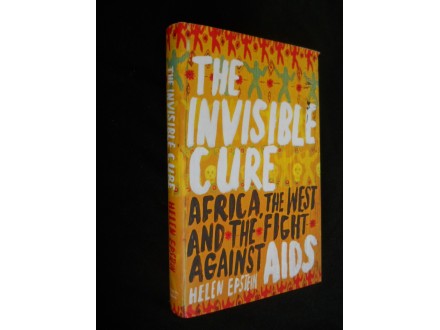Helen Epstein THE INVISIBLE CURE
| Cena: |
| Stanje: | Polovan bez oštećenja |
| Garancija: | Ne |
| Isporuka: | Pošta Post Express Lično preuzimanje Organizovani transport: 129 din |
| Plaćanje: | Tekući račun (pre slanja)
PostNet (pre slanja) Lično |
| Grad: |
Smederevska Palanka, Smederevska Palanka |
ISBN: Ostalo
Godina izdanja: 2007.
Jezik: Engleski
Autor: Strani
Africa, the West, and the fight against AIDS
Udžbenički format, tvrd povez sa omotom, 326 strana.
Kao nova knjiga.
In many ways, AIDS in Africa is no different from AIDS in the United States and Europe. It’s caused by the same virus (HIV), which kills people in the same way, although the opportunistic infections that evade HIV-compromised immune systems are caused by locally circulating pathogens, with tuberculosis to the fore in Africa. In The invisible cure: Africa, the West, and the fight against AIDS, Helen Epstein — a visiting research scholar at Princeton University — discusses important distinctions about AIDS in Africa, focusing on Uganda and South Africa, where she has covered the epidemic at close hand for 15 years. Her scientific training and time spent as a young researcher in a Ugandan laboratory help ensure she covers AIDS science accurately, although this is a peripheral theme. Her central focus is on a critical question: Why has HIV spread so much more efficiently among heterosexuals in Africa than anywhere else in the world?
There is no doubt HIV can be sexually transmitted from a man to a woman, or vice versa. As Epstein notes, Africans knew this before Western science did. “We suspected the disease [AIDS] came from sex even before the missionaries and doctors came to tell us,” in the words of a Ugandan farmer recalling the impact of AIDS on her community in the early 1980s. Yet in Africa, heterosexual HIV spread is much more frequent than that in the United States and Europe, such that around 50% of all HIV-infected Africans are women. Arguments that locally circulating viruses are more heterosexually transmissible don’t stand up to inspection; human genetic or epigenetic factors seem more likely to be responsible. For example, the greater prevalence of other sexually transmitted diseases in Africa, particularly herpes simplex virus–2, may be relevant. Epstein, however, strongly favors a cultural explanation, and her book is structured around, and to support, these arguments.
Are Africans simply more promiscuous than Australians or Americans? Surveys about sexual behavior are notoriously prone to interviewees not telling the truth, the whole truth, and nothing but the truth. In general, men exaggerate their number of partners, women the opposite. However, this is true whether the survey is carried out in Soweto, Sydney, or San Francisco. And when the sand settles on the statistics, surveys suggest that Africans probably have no more sex partners in their lifetimes, on average, than anyone else, apparently arguing against a behavioral explanation for the high incidence of heterosexual AIDS in Africa.
AIDS, sida, Afrika...
Lično preuzimanje se odnosi na preuzimanje u Smederevskoj Palanci.
Kada je o prodaji knjiga reč, pod `organizovanim transportom` smatram preporučenu tiskovinu ili paket (kada su kompleti i teže knjige). To je najpovoljniji način slanja, knjiga ponekad stiže za dan, ali obično ne, poštar ne zove primaoca telefonom. (Prilikom kupovine se čekira `Pošta` ili `Organizovani transport`, koji u zavisnosti od toga kada je knjiga stavljena u prodaju ima i zastarele cene poštarine).
Post Express je dvostruko skuplji ali brže stiže.
Običnu tiskovinu ne šaljem jer nemam dokaz o slanju. Molim Vas da ako insistirate na običnoj tiskovini, knjige ne kupujete od mene.
Novi cenovnik Pošte za preporučenu tiskovinu - organizovani transport (cene su zaokružene):
- 100g-250g - 140 dinara
- 250g-500g - 170 dinara
- 500g-1kg - 180 dinara
- 1kg-2kg - 210 dinara
Ne postoji opcija slanja preporučene tiskovine teže od 2 kg, tako da se te pošiljke šalju kao paket.
Molim kupce iz inostranstva da me pre kupovine kontaktiraju porukom kako bismo se dogovorili oko uslova uplaćivanja i slanja. Ovo je veoma bitno, između ostalog, i zbog toga što su poštarine Pošte Srbije visoke i za zemlje u okruženju jer se pošiljke šalju isključivo avionom.
Besplatna poštarina se ne odnosi na slanje u inostranstvo.
Pogledajte i ponudu na:
https://www.kupindo.com/pretraga.php?Grupa=1&Pretraga=&CeleReci=0&UNaslovu=0&Prodavac=anarh&Okrug=-1&Opstina=-1&CenaOd=&CenaDo=&submit=tra%C5%BEi
Ukoliko i tamo nešto pronađete, platićete preko istog računa i uštedeti na poštarini.
Predmet: 55242835











